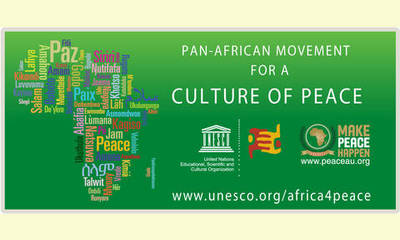|
|
Sources and Resources for a Culture of Peace in Africa
un articulo por David Adams for CPNN
CPNN readers may be aware of a number of major
culture of peace initiatives conducted by UNESCO
over the past few years in Africa. These include:

click on photo to enlarge
* The Forum of
Reflection on a culture of peace in West Africa,
Abidjian, Côte d'Ivoire, June 2012
* The Pan-
African Forum on sources and resources for a culture
of peace, Luanda, Angola, March 2013
* The establishment of a network of foundations and
research institutions for a culture of peace,
Addis Ababa, Ethiopia, September 2013
Now, the conclusions of these initiatives along with
an overall analysis of Africa's potential for a
culture of peace, have been put into a single brochure by UNESCO.
Given that “the implementation of the concept of
the Culture of Peace in Africa requires an
endogenous approach, which is holistic and
interdisciplinary, involving intergovernmental,
governmental, community, private sector and civil
society actors” UNESCO contributes, together with
a wide range of partners and stakeholders, in the
promotion of peace education and women and young
people empowerment to foster democratic
participation; in the promotion of the role of
media and ICTs for intercultural and
interreligious dialogue; in highlighting the
importance of heritage and contemporary creativity
as tools for building peace; and, finally, to the
development of scientific cooperation to promote
the peaceful management of natural resources and
opportunities for dialogue between scientists,
especially in conflict-affected areas.
On a continental level, the African Union has also
launched a series of political initiatives and
programmes aiming at achieving peace and
sustainable development, e.g.:
• International Campaign “Make Peace Happen”
including the celebration of the International Day
of Peace (21 September) and Peace building
education initiative in Fragile States.
• African Charter for Youth and Plan of Action
for Youth Decade (2009--2018)
• Year of Shared Values Plan of action (2012)
• African Charter on Democracy, Elections and
Governance
• Africa Women’s Decade (2010--2020)
• Panafrican University (with reference to
education for peace and democracy)
• Conflict Prevention Policy Framework
• African Solidarity Initiative
• 2063 Agenda for the Development of Africa
The brochure is too rich to be summarized quickly in
this brief article, so CPNN readers are urged to go
to the original.
Here are a few quotations to give a flavor of its
richness:
Wole Soyinika: "There is a deep lesson for the
world in the black races' capacity to forgive, one
which, I often think, has much to do with ethical
precepts which spring from their world view and
authentic religions. . . "
Wangari Maathai points out that "In time the tree
also became a symbol for peace and conflict
resolution . . . Using trees as a symbol of peace
is in keeping with a widespread African tradition.
. . "
"African humanism (Ubuntu) is a priceless treasure
( . . .) It may be a good and service - the most
precious gift trhat Africa has to offer the world
- a gift which can be converted into capital."
(Joseph Ki-Zerbo).
(Click here for a Portuguese version of this article or here for a French version)
|








|
DISCUSSION
Pregunta(s) relacionada(s) al artículo :
Will UNESCO once again play a role in the culture of peace?,
* * * * *
Comentario más reciente:
:
It is very appropriate that this new impulse for the culture of peace at UNESCO should come from Côte d’Ivoire, since the global movement for a culture of peace was initiated at a UNESCO conference in that country in 1989. See Yamoussoukro and Seville in the early history of the culture of peace.
Note added on September 2:
The official reports from the UNESCO Conference in Abidjian are now available:
English
French

|
|









